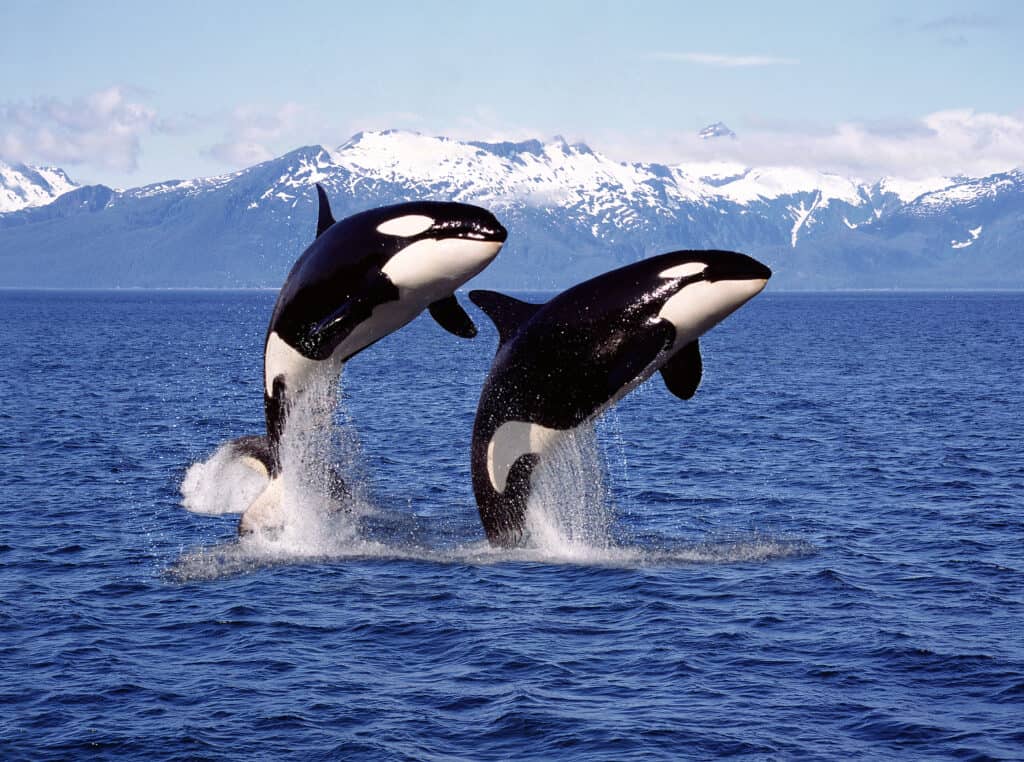


 11:51:17
11:51:17  2023-05-06
2023-05-06  1706
1706

Orcas, or killer whales, are the largest of the dolphins and one of the world's most powerful predators. They're immediately recognizable by their distinctive black-and-white coloring. Smart and social, orcas make a wide variety of communicative sounds, and each pod has distinctive noises that its members will recognize even at a distance. They use echolocation to communicate and hunt, making sounds that travel underwater until they encounter objects, then bounce back, revealing their location, size, and shape.
Though they often frequent cold, coastal waters, orcas can be found from the polar regions to the Equator. They're at the top of the food chain and have very diverse diets, feasting on fish, penguins, and marine mammals such as seals, sea lions, and even whales, employing teeth that can be four inches long. They are known to grab seals right off the ice. They also eat fish, squid, and seabirds.
Orcas hunt in deadly pods, family groups of up to 40 individuals. There appear to be both resident and transient pod populations of orcas. These different groups may prey on different animals and use different techniques to catch them. Resident pods tend to prefer fish, while transient pods target marine mammals. All pods use effective, cooperative hunting techniques that some liken to the behavior of wolf packs.
Orcas are protective of their young, and other adolescent females often assist the mother in caring for them. Mothers give birth every three to ten years, after a 17-month pregnancy. They give birth to one baby at a time, which may nurse for up to two years. In most cases, the bond between juvenile and mother will eventually weaken, and the young orca will go its own way, but in some pods, the juvenile may stay with the pod it was born into its entire life.
Orcas are highly intelligent, social mammals that have long been a part of marine park entertainment, performing shows for audiences. However, it's become increasingly clear that orcas do not thrive in captivity.
They have evolved to swim up to 40 miles a day, foraging for food and exercising. They dive 100 to 500 feet, several times a day, every day. Whether they're born in the wild or in captivity, all orcas born have the same innate drive to swim far and dive deep. Artificial enclosures in captivity cannon offer that kind of range to orcas, contributing to boredom and stress. Orcas have been seen to develop stereotypies, also known as zoochosis—repetitive patterns of activity that have no obvious function, which range from self-mutilation to rocking and swaying. Usually related to stress and inappropriate habitats, stereotypic behavior has been documented in orcas in scientific research since the late 1980s.
Reality Of Islam |
|

A new ultra

Batteries p

Some 1.2 bi
 9:3:43
9:3:43
 2018-11-05
2018-11-05
10 benefits of Marriage in Islam
 7:5:22
7:5:22
 2019-04-08
2019-04-08
benefits of reciting surat yunus, hud &
 9:45:7
9:45:7
 2018-12-24
2018-12-24
advantages & disadvantages of divorce
 11:35:12
11:35:12
 2018-06-10
2018-06-10
 6:0:51
6:0:51
 2018-10-16
2018-10-16
 10:47:11
10:47:11
 2022-11-22
2022-11-22
 8:21:9
8:21:9
 2018-06-21
2018-06-21
 3:43:50
3:43:50
 2022-11-05
2022-11-05
al-hussain (peace be upon him)
 10:18:1
10:18:1
 2022-09-21
2022-09-21
 8:19:41
8:19:41
 2018-06-21
2018-06-21
 9:39:36
9:39:36
 2022-12-28
2022-12-28
 6:0:8
6:0:8
 2023-03-19
2023-03-19
 5:41:46
5:41:46
 2023-03-18
2023-03-18
| LATEST |